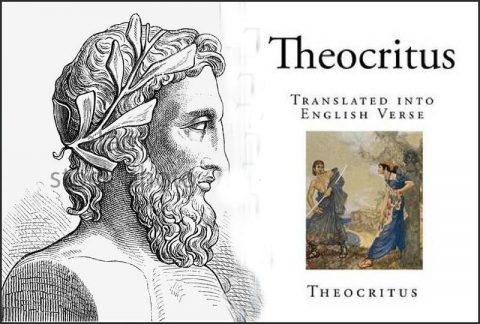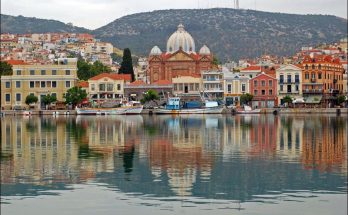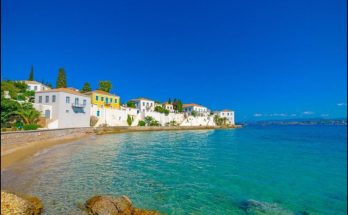Theocritus was born about 310 B. C. in Sicily and died later than 270; he lived and worked in Sicily, in the island of Cos, and in Alexandria. Nearly all his poems are in hexameter verse; they are mostly named eidyllia (our ‘idylls’), which probably means ‘little pictures’. The favourite subject is the life of rustics–their work, love-troubles, pleasures, and quarrels. Though Theocritus has much realism, and little of that artificial daintiness which marks the pastoral verse of our ‘Augustan’ era and the absurd ‘hamlet’ at Versailles, he nevertheless heightens and sophisticates the charm of rural life.
Harvest Home, the Seventh Idyll, tells how the poet and some friends, walking to a harvest festival, fell in with Lycidas, a goatherd, who challenged Theocritus to a singing match. Lycidas’ own song is a marvel of melodious grace: …And he shall sing me how the big chest held (All through the maniac malice of his lord) A living goatherd: how the round-faced bees, Lured from their meadow by the cedar smell, Fed him with daintiest flowers, because the Muse Had made his lips a haunt of honeyed song. Happy Cometes, this sweet lot was thine! The chest thy lodging and the honeycomb Thy meat, thou didst fulfil the natural year. And oh hadst thou been numbered with the quick In my day! I had led thy pretty goats About the hill-side, listening to thy voice: While thou hadst lain thee down ‘neath oak or pine, Divine Cometes, warbling pleasantly.
At the close is a description of the harvest festival, lines which murmur and drowse with the opulent fruits and scents of late summer. The Eighth Idyll contains a delicious stanza which provided Blackmore with a motto for Lorna Doone. In English it might run thus: No wide domain, nor golden treasure, Nor speed like wind across the lea, I pray for: here I find my pleasure, In this cliff-shade embracing thee, My grazing sheep to watch at leisure, And sing to yon Sicilian sea.
The Fisher-Idyll, not written by Theocritus, is saturated with the odours, sounds, and quiet emotions of the life led by two old fishermen in their poor hut by the tideless Mediterranean water. There is one marvellous line: ‘Already have I seen a thousand dreams, but the dawn is not yet.’
Not all these idylls are pastoral. The Second depicts a girl seeking by spells and fierce incantations during the night to regain her lover: Hushed are the voices of the winds and seas; But.O not hushed the voice of my despair. He burns my being up, who left me here Unwifed, unmaidened, in my misery.
Theocritus is the most original of the Alexandrians, but he is typical of the age in his erudition, his social feeling, and his preoccupation with art. His learning is not specially great; the point is that it forms part of his literary material–not always consciously paraded, but pervasive nevertheless. The wine at the -harvest home he instinctively compares with the drink given by Odysseus to the Cyclops; in his account of Pentheus’ death he imitates from Euripides a pun on the king’s name; and his longest poems are miniature epics modelled upon Homer.
The social feeling is that of the Hellenistic world: Theocritus is a cosmopolitan–it seems to matter little where he lives, in Sicily, Cos, or Alexandria, just as many modern novels might indifferently have been written in New York, Winchester, or Stockholm. But one cannot imagine Sophocles writing in Cyrene, any more than Smollett in Florence. The reason is that Alexander’s conquests, having destroyed the Greek city-state as a spiritual entity, had enfranchised the individual.
It is this last fact which accounts for the re-appearance of love as a material for literature after it had been largely held in abeyance by the Attic spirit: in the New Comedy and in men like Theocritus and Apollonius Rhodius lovestories and all that we mean by romance leap into importance because politics are now a matter for remote and professional governors. Lastly, Theocritus’ preoccupation with art is a sign of his epoch. It is not only that he says much concerning the power of song, the sweetness of music: he admires virtuosity. And other arts attract him strongly.
The wooden cup of the First Idyll has carvings to which the poet devotes a wealth of skilful enthusiasm ( Sophocles in a similar connexion says simply ‘the product of a dexterous man’); in the Fifteenth Idyll the wonders in Ptolemy’s palace excite a rapture of admiration for manual cunning which extends even to the gingerbread animals. All these elements can be paralleled in earlier literature: the ivory distaff may remind us of Alcaeus’ connoisseurship in dainty armour. But the perspective is different. Theocritus, despite his power, is a littérateur: one often feels that he values life as material for poems.
Visits: 532



